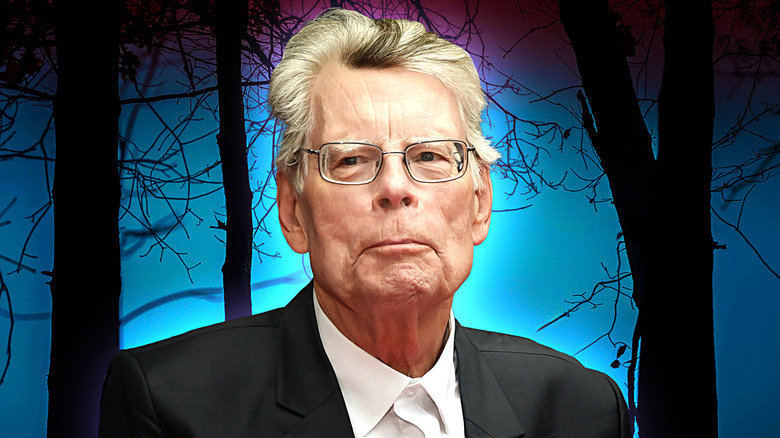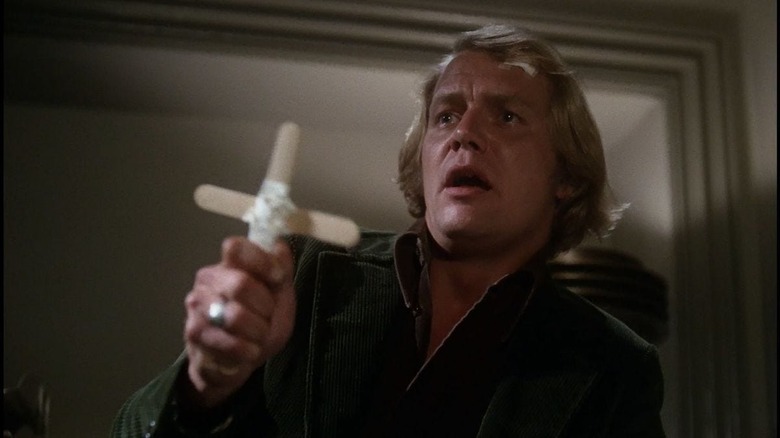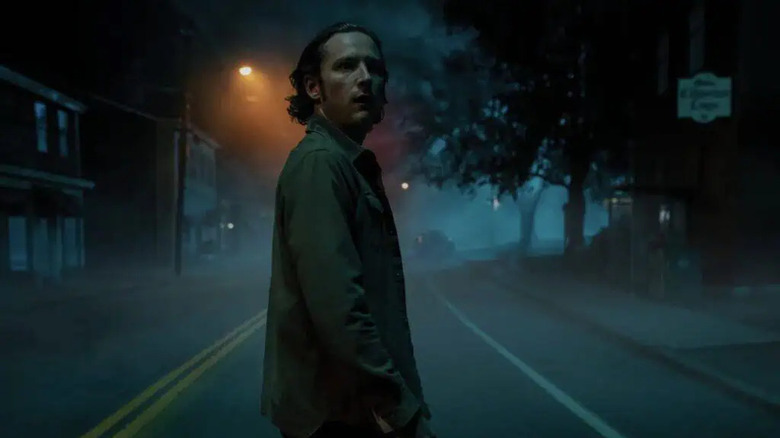Why Stephen King Once Called Salem's Lot His Favorite Story
History is a strange beast. Sometimes, all of us collectively understand that we're living through a major historical moment, usually involving some awful tragedy or a time of particular hardship. Yet most times, an era cannot be understood by the people currently living it; it's only after the benefit of hindsight that we can assign origin points and milestones to events that, while they were happening, seemed of little note. It's one of the reasons why critics, historians, and especially artists are so valuable to our culture, as part of their job is to try and keep watch for such course-changing events and trends while they're still occurring, either to point them out for celebration or to warn against their continuation.
Although the novel "Salem's Lot" was written early in Stephen King's career, it proves that King was already a keen observer of American culture, pop and otherwise. The novel works brilliantly on several levels: for one, it's just damn scary, with King using his powers of prose to create a genuinely dread-filled atmosphere that pervades the book. For another, it's a clever integration of the classical "rules" and tropes of the vampire transplanted into the then-modern day. As a matter of fact, it does for the horror genre what filmmakers like Tobe Hooper (who not coincidentally would first adapt "Salem's Lot" to the screen in 1979) were just beginning to do and others like Steven Spielberg would later do, which is to bring the classic monsters and villains of horror out from the dank castles and remote villages of yesteryear and into the small towns of America, putting them literally and figuratively next door to us. While there are many reasons why King would think of "Salem's Lot" as being his favorite story, it's actually for a far more eerie historical reason that the author has affection for that novel in particular.
The spooky way King got his title for 'Salem's Lot'
The main reason why King cites "Salem's Lot" as perhaps his favorite story is also how the book (and the town the book is set in) got its title. Speaking to Phil Konstantin in 1987 for "The Highway Patrolman" magazine, King first explained why he enjoys "Salem's Lot" as much as he does:
"In a way it is my favorite story, mostly because of what it says about small towns. They are kind of a dying organism right now. The story seems sort of down home to me. I have a special cold spot in my heart for it!"
As a follow-up, the author further elucidated on the origin of the story and how the book and town got its name from a real-life incident-cum-urban-legend:
"It is based on a town in upstate Vermont, that I heard about as an undergraduate in college, called Jeremiah's Lot. I was going through Vermont with a friend and he pointed out the town, just in passing, as we went by in the car. He said, 'You know, they say that everybody in that town just simply disappeared in 1908.' I said, 'Aw, come on. What are you talking about?' He said, 'That's the story. Haven't you heard of the Marie Celeste where everybody supposedly disappeared? This is the same thing. One day they were there and then one day a relative came over to look for someone that they hadn't heard from in awhile; and all of the houses were empty. Some of the houses had dinner set on the table. Some of the stores still had money in them. It was covered in mold from the summer damp and it was starting to rot, but nobody had stolen it. The town was completely emptied out.'"
Although the interview took another turn from there, it's not hard to see how King's mind took that turn-of-the-century story and spun it into a new context involving a vampire moving into a small town and steadily depopulating (or, more accurately, converting) its citizenry.
'Salem's Lot' remains relevant
Even if King was only half cognizant of the deeper meaning he was getting at with "Salem's Lot," it's still remarkable how the author either deliberately or inherently understood the complimentary opposites of the vampire mythos and a state of nostalgia. Part of the appeal of the vampire as a horror creature is the idea of immortality, although you'd have an insatiable thirst for blood (and, likely, an aversion to basking in the daylight), you'd remain young, beautiful, and ailment-free forever. "Salem's Lot" takes a hard look at how nostalgia for one's past and youth — whether on a personal level or a national one — is a trap. Things, like people, change and decay because they must, and there's no real way to stop or reverse that process.
That doesn't mean wishing one could turn back the clock is a bad thing, nor that the loss of the "down home" aspects of American life, as King puts it, isn't to be lamented! The current adaptation of "Salem's Lot," streaming on Max and written and directed by Gary Dauberman, manages to keep this theme intact in several rather ingenious ways. Dauberman makes the movie a period piece, setting it in the same year the novel was originally published, allowing the movie itself to be nostalgic for that period of American history and especially that era's horror films. His choice to feature a drive-in theater as the town's traditional pastime (as opposed to a sporting event or some other such activity) only heightens this theme, as drive-ins themselves are nearly extinct, with the few remaining in operation being able to do so thanks in large part to horror fans.
Who knows if King still regards "Salem's Lot" as his favorite overall story of his some 37 years after giving that interview. After all, one of the facts of life when it comes to the years passing is that your opinions and viewpoints can change. So, in a way, the Stephen King of 2024 is not the same King from 1987. Yet, like the undead, the novel "Salem's Lot" remains available, unchanged, a warning about the future from the increasingly distant past. For as another adage goes, the more things change, the more they remain the same.
"Salem's Lot" is streaming on Max.


